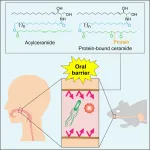In a novel randomized clinical trial published in JAMA Network Open, senior author Ted J. Kaptchuk at Beth Israel Deaconess Medical Center (BIDMC), lead author Annabelle Belcher, PhD, of the University of Maryland School of Medicine, and colleagues tested whether using open-label placebo could increase the efficacy of methadone treatment for people undergoing care for opioid use disorder. The researchers found that participants who knowingly received placebo pills in addition to standard-of-care methadone treatment were significantly more likely to remain in treatment than participants who received methadone treatment alone. Participants who received placebo pills also reported better sleep quality.
"The clinical implications of our intervention have great potential impact, as retention in treatment is a serious challenge for the field of addiction medicine,” said Belcher. “We’ve demonstrated it’s feasible to administer a placebo in addition to standard-of-care methadone in a community-based opioid treatment setting without adding a significant burden to clinic procedures, and the low-cost, low-risk nature of this intervention could provide an appealing strategy to target early methadone treatment adherence.”
It has long been assumed that deception or concealment is necessary for placebo effects – i.e. “tricking” a patient to believe an inert pill contains active medication. But, a growing body of evidence in randomized controlled trials with irritable bowel syndrome, chronic low back pain, cancer-related fatigue, migraine and other conditions has demonstrated no such deception is necessary for placebo treatment to alleviate symptoms. Additionally, conditioning study participants to placebos by having them pair the placebo with an active medication – thereby potentially associating the placebo with a relief in symptoms that may be caused by the active drug – has also been shown to treat symptoms of insomnia, ADHD, post-surgical pain, and more.
For this two-arm, open-label, single-blind randomized controlled trial, 131 newly enrolled adult patients seeking treatment for moderate-to-severe opioid use disorder (OUD) at an academically affiliated community opioid treatment program were recruited. All participants were informed of the possible benefits of open-label placebo and conditioning. The research team also described the neurobiological and psychological mechanisms of placebo effects and conditioning in lay terms and in a routine, supportive setting. Then, participants were randomized either to receive treatment-as-usual or treatment-as-usual plus conditioned open-label placebo (microcrystalline cellulose pills).
While the participants were aware that they were taking a placebo pill, the clinical addiction care team was unaware as to which participants were in the treatment-as-usual or treatment-plus-placebo groups and the trial altogether to avoid any unconscious differential treatment. All participants were seen at weeks two, four, eight, and 12 after the initial enrollment and underwent the same outcome assessments. Those in the placebo group were not provided with any additional information about placebos or the rationale of the study beyond what was provided at the baseline meeting.
Researchers assessed patients' 90-day methadone dose, treatment retention, self-reported drug use, withdrawal, craving, quality of life, and sleep quality. Contrary to the researchers’ expectations, the conditioned open-label placebo had no impact on the 90-day methadone dose. However, participants treated with open-label placebo were significantly more likely to remain in treatment; 78 percent of the placebo-treated group stayed with the program compared to 61 percent of the methadone-only group. The placebo group also reported better sleep quality. No statistically significant differences were found in any other outcome measures.
“Implementing a unique combination of two methods to harness the placebo effect – open-label placebo and pharmacological conditioning – we found a significant difference in the group's 90-day retention rates, demonstrating that placebo treatment can provide valuable benefits and still adhere to ethical norms of informed consent,” said Kaptchuk, director of the Program in Placebo Studies and the Therapeutic Encounter at BIDMC and professor of medicine at Harvard Medical School. “Previous assumptions that placebo treatment needs concealment or deception to ‘work’ are not true. Additionally, there is growing evidence that open-label placebo demonstrates similar neurotransmitter engagement to double-blind and deceptive placebos. It is important to note that a patient-clinician relationship is an important component of open-label placebo.”
Co-authors included Thomas O. Cole, MA, Emerson M. Wickwire, PhD, Aaron D. Greenblatt, MD, William Wooten, MS, and Lawrence Magder, PhD, and Eric Weintraub, MD, of University of Maryland, School of Medicine; Ebonie Massey, MA, Amy S. Billing, MSSA, Michael Wagner, PhD, and Eric D. Wish, PhD, of Center for Substance Abuse Research (CESAR), University of Maryland; David H. Epstein, PhD, of Real-world Assessment, Prediction, and Treatment Unit, National Institute on Drug Abuse Intramural Research Program (NIDA-IRP/NIH); Stephen W. Hoag, PhD, of University of Maryland, School of Pharmacy; Luana Colloca, MD, of University of Maryland School of Nursing; and John Rotrosen, MD, of NYU Grossman School of Medicine.
This work was supported by the Foundation for the Science of the Therapeutic Encounter; the University of Maryland MPowering the State Opioid Use Disorders Initiative; the University of Maryland, Baltimore, Institute, for Clinical & Translational Research (ICTR); the National Center for Advancing Translational Sciences (NCATS) Clinical Translational Science Award (CTSA) (grant number 1UL1TR003098.)
Please see the publication online for a complete list of disclosures.
About Beth Israel Deaconess Medical Center
Beth Israel Deaconess Medical Center is a leading academic medical center, where extraordinary care is supported by high-quality education and research. BIDMC is a teaching affiliate of Harvard Medical School, and consistently ranks as a national leader among independent hospitals in National Institutes of Health funding. BIDMC is the official hospital of the Boston Red Sox.
Beth Israel Deaconess Medical Center is a part of Beth Israel Lahey Health, a health care system that brings together academic medical centers and teaching hospitals, community and specialty hospitals, more than 4,800 physicians and 36,000 employees in a shared mission to expand access to great care and advance the science and practice of medicine through groundbreaking research and education.
# # #
END



